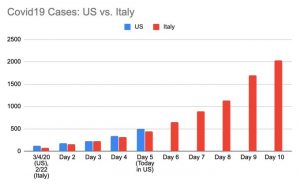Social Recession
I went to the grocery store this afternoon. As I was walking in I heard a woman yell to me from her car. I walked over and found an elderly woman and her husband. She cracked her window open a bit more, and explained to me nearly in tears that they are afraid to go in the store.
Afraid to get sick as they are in their 80’s and hear that the novel coronavirus is affecting older people disproportionately. And that they don’t have family around to help them out. Through the crack in the window she handed me a $100 bill and a grocery list, and asked if I would be willing to buy her groceries.
I bought the groceries and placed them in her trunk, and gave her back the change. She told me she had been sitting in the car for nearly 45 min before I had arrived, waiting to ask the right person for help.
I know it’s a time of hysteria and nerves, but offer to help anyone you can. Not everyone has people to turn to.
~Rebecca Mehra
VOX
by Ezra Klein
Social distancing is crucial to slow the coronavirus.
But it’s going to cause a “social recession”: a collapse in social contact that will hit the elderly and people with disabilities particularly hard.
Loneliness can be lethal. We need to help them.
Make no mistake: The rapid implementation of social distancing is necessary to flatten the coronavirus curve and prevent the current pandemic from worsening. But just as the coronavirus fallout threatens to cause an economic recession, it’s also going to cause what we might call a “social recession”: a collapse in social contact that is particularly hard on the populations most vulnerable to isolation and loneliness — older adults and people with disabilities or preexisting health conditions.
“We’re now officially in a pandemic,” says Eric Klinenberg, a New York University sociologist who has studied the way social isolation leaves older Americans vulnerable in emergencies. “But we’ve also entered a new period of social pain. There’s going to be a level of social suffering related to isolation and the cost of social distancing that very few people are discussing yet.”
Congress and the administration are, even now, debating the best tools to deploy in fighting the coronavirus’s economic effects. Washington is deep in a debate over payroll tax cuts, industry bailouts, and paid sick leave. But there are fewer policy tools to fight a social recession. What all the experts I spoke to agreed on was this: Just as it’s incumbent on those of us least affected by coronavirus to take precautions to limit its spread, it’s also important that we reach out to limit its social damage.
“The brunt of Covid-19 will be borne by the poor, elderly, and sick,” says former US Surgeon General Vivek Murthy, “and it is up to us to ensure they are not left behind.”
“Social isolation has been associated with a significantly increased risk of premature mortality from all causes,” the report found, including a “50 percent increased risk of developing dementia,” a “29 percent increased risk of incident coronary heart disease,” a “25 percent increased risk for cancer mortality,” a “59 percent increased risk of functional decline,” and a “32 percent increased risk of stroke.” The mental health risks are also profound. The researchers reviewed dozens of studies and found a consistent relationship between social isolation and depression, anxiety, and suicidal ideation.
“A lot of my work is premised on the idea that extreme situations like the one we’re in now allow us to see conditions that are always present but difficult to perceive,” Klinenberg says. “We’re going to learn a lot about who we are and what we value in the next few months.”
The Oregonian
10 ways to deal with coronavirus-related stress and anxiety
1. Practice self-awareness
According to Sydney Ey, a professor of psychiatry at Oregon Health & Science University, the first step to dealing with stress and the anxiety it causes is to be aware of how you are dealing with it.
When Ey works with people suffering from anxiety, she said, “I have them identify what’s a sign when they are feeling stressed, where do they feel it in their body.”
We all have habits that we engage in when we’re feeling stressed, she said. Maybe it’s hitting the fast-food drive-thru or disappearing into our phones. Be aware of your signs, Ey said. Notice when you fall back on them. Notice when you feel your body tensing. That is when you take action.
2. Focus on your body
Once you recognize that you are anxious, try to calm your body.
“If you can calm your body down, and release some of the stress hormones,” Ey said, “then your mind will follow.”
Her number one recommendation? Exercise.
“I really encourage people on a daily basis to find some way of moving,” Ey said, even if it’s just going for a walk.
Another way to help your body relax, Ey said, is by practicing it. “Maybe a couple times during the day,” she said, “take a couple moments to relax.”
She suggested taking 10 deep breaths or focusing on tense muscles and softening them. She said apps like Headspace and Calm can help people who need a little guidance.
3. Don’t forget to eat, sleep and drink water
It’s also incredibly important to not neglect your body’s basic needs, Ey said.
“It’s really important to continue prioritizing sleep,” she said. “Still eat and hydrate. If you’re not feeling well stay home and take a break.”
4. Stay connected
“The most important thing is for people to remain connected,” Rev. Bill Sinkford, the Senior Minister at Portland’s First Unitarian Church, told us. “The great danger here is isolation.”
Even though his church has opted to cancel Sunday services, they are looking for more ways to help people engage with one another. Social distancing may mean not meeting up in person, but he recommends email, Facebook groups and even the old fashion phone tree.
“The longer this crisis lasts, the more intense that sense of isolation is likely to be,” he said. “Connecting emotionally or spiritually is what we need to focus on most.”
5. Set meaningful, positive goals
Whether you are at work or at home, Ey suggests trying to do some meaningful, positive, productive things.
Moving towards goals, she said, is one way to stay present in the face of anxiety and unrest.
“Find ways to be effective,” Ey said. “Do things that are meaningful.”
6. Be informed, take precautions, but limit your exposure to the news
Neither Ey nor Sinkford recommends ignoring the news or pretending we aren’t in the middle of a crisis.
“Be informed,” Ey said, “but limit how much time you’re spending reading about this if it’s really causing you a lot of stress.”
“Anxiety is justified,” Sinkford said. “There is a real risk and real danger.”
But, he added, “There’s a whole series of things each of us can do to minimize the risks to ourselves and our families.”
Don’t forget those basic practices, he said, like washing hands and covering coughs. And employ bigger changes too, like no more handshakes and practice social distancing.
7. Find uplifting moments
“Pay attention to what is positive and uplifting,” Ey said. Flowers are blooming, babies are blissfully unaware of what’s happening, you are connected to your body and your community. Even in these chaotic moments, those beautiful things are still happening. Notice them.
8. Remember your strength
Almost every one of us has been through adversity before. Ey suggests remembering that, and focusing on the strengths you’ve used before.
“I often ask people to think about another difficult time in their life when they dealt with uncertainty,” she said. “What were the strengths they drew on? How can they learn from that and apply it now?”
9. Play it out
Another exercise Ey suggests is actually diving into your anxiety and playing out the worst-case scenario in your mind. What does that look like, and how would you overcome it? Remember that strength from number seven? How would you use it if the absolute worst thing were to happen? How would you survive?
Now turn it around. Ask yourself, what’s the best thing that could come out of this?
10. Seek help if you need it
There is no shame in asking for help.
“If people are finding they can’t stop worrying,” Ey said, “it might be helpful for them to talk to a counselor short term worries.”
— Lizzy Acker
Infections Diseases Show Societies Who They Really Are
‘Communicable disease has haunted humanity for all of history. As such, the responses to coronavirus in our midst have a grimly timeless quality. In fact, to one scholar, epidemics are a great lens for peering into the values, temperament, infrastructures and moral structures of the societies they attack. Frank M. Snowden is a professor emeritus of the history of medicine at Yale and author of Epidemics and Society: From the Black Death to the Present. An epidemic, he writes, “holds a mirror” to the civilization in which it occurs. He talks to Bob about what we can learn about ourselves from the infectious diseases we’ve faced, from the bubonic plague in the 14th century to the Ebola outbreak in 2014 to COVID-19 today.’
To listen to the podcast follow the link:
Message of hope spreading in Italy. Tour guide in Venice: ‘It’s human to be scared, but I don’t see panicking, nor acts of selfishness.’ Italian journalist: ‘After a moment of panic in the population, there is now a new solidarity.’



Leave a Reply